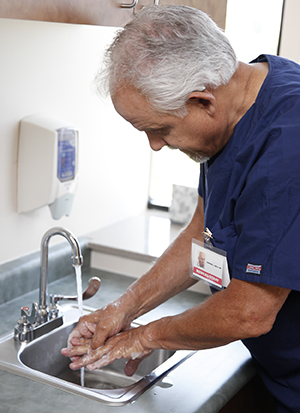Standard Precautions: Handwashing
Frequent and thorough handwashing is the best way to prevent infection. The sooner you wash your hands after exposure, the less likely you are to catch or spread an infection.
 |
| Washing your hands is the best way to stop the spread of infection. |
When to wash your hands
Wash your hands regularly throughout the day, especially:
-
When first arriving at work and before leaving
-
Before and after caring for a patient
-
After touching blood or any other body fluid or substance, broken skin, or mucous membranes
-
After touching an object or surface that is or may be contaminated
-
Before and after eating, drinking, smoking, and after using the restroom
-
After coughing, sneezing, or blowing your nose
How to wash your hands
First, carefully remove gloves and other PPE. Follow your facility’s guidelines for dealing with jewelry. Then follow these steps:
-
Use clean, running water and plenty of soap. Work up a good lather by rubbing your hands together.
-
Clean your whole hand, under your nails, between your fingers, and up your wrists. Rub vigorously. Wash for at least 20 seconds (or the time it takes to sing the "Happy Birthday" song from start to finish twice. (CDC).
-
Rinse your hands well. Let the water run off your fingertips, not up your wrists.
-
Dry your hands well with clean paper towels. Or use an air dryer machine. Use paper towels to turn off the faucet and open the door so you don’t recontaminate your hands.
-
If no sink is available or your hands are not visibly soiled, use the alcohol-based hand sanitizer approved by your facility. Be sure it contains no less than 60% alcohol. To use a sanitizer, apply the gel onto 1 palm, following the recommended dosage from the label, and spread it across all hand surfaces. Rub hands and fingers together until dry, typically about 20 seconds. These products are fast-acting and significantly reduce the number of germs on the skin. Unfortunately, they don't work on all types of germs in the hospital. They may also not be effective when your hands have visible dirt or grease. Wash with soap and water as soon as you can.
Online Medical Reviewer:
Marianne Fraser MSN RN
Online Medical Reviewer:
Raymond Turley Jr PA-C
Online Medical Reviewer:
Shaziya Allarakha MD
Date Last Reviewed:
8/1/2024
© 2000-2024 The StayWell Company, LLC. All rights reserved. This information is not intended as a substitute for professional medical care. Always follow your healthcare professional's instructions.